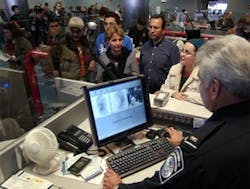Airline Passengers to Be Asked for Data
WASHINGTON (AP) -- Airline passengers soon will be asked to provide their full names and birth dates when they buy tickets, information the government says it needs for a new computerized screening system.
The Bush administration is moving ahead with plans to implement the system, called Secure Flight, even though concerns about privacy and other issues raised in a congressional investigation have not been fully addressed. A limited rollout of the program is set for later this year.
As part of the Transportation Security Administration's effort to implement Secure Flight, the agency will, within weeks, require airlines to solicit passengers' full names and birth dates. Passengers do not have to provide it, but if they don't there's a better chance they'll have to undergo more stringent screening at the airport, said Justin Oberman, the TSA official who heads the program.
Oberman said having passengers' full names and birth dates will make it less likely that they'll be confused with people who are known or suspected terrorists.
''Far fewer people will be inconvenienced than they are today,'' Oberman said Wednesday.
Such confusion has brought the TSA much criticism. Sen. Edward M. Kennedy, D-Mass., is among those whose name matched someone on a watch list.
Congress passed a law last year that said the system couldn't go live until the Government Accountability Office reported it met 10 criteria, including adequate privacy protections, accuracy of data, a system of redress and safeguards to ensure the system won't be abused or accessed by unauthorized people.
In March, the TSA flunked nine of the 10 criteria.
Oberman said the GAO based its conclusions on information collected in February, and that TSA has made progress since then. For example, TSA has set up a redress office that later this year will add staff that can field complaints from people who say they've been misidentified as terrorists, he said.
''A lot has changed,'' Oberman said. ''We're working very closely with GAO and intend to meet all 10 criteria when we start in August.''
The government has been looking for ways to upgrade passenger screening since the Sept. 11 attacks. Previous attempts were scrapped amid concerns the government would obtain too much personal information without enough safeguards to keep it private.
Secure Flight would let the TSA take over from the airlines the responsibility of checking passengers' names against lists of known or suspected terrorists. Before a flight takes off, the airlines will send data about their passengers to the TSA, which will check their names against the lists.
The TSA plans to use data from two unidentified airlines in the first phase of Secure Flight, and gradually bring others on line because each airline has unique technical issues.
But Congress may block the effort until the agency can show it has fixed the problems GAO identified.
Cathleen Berrick, director of the GAO's Homeland Security and Justice auditing arm, said several committees have expressed interest in having her office do a follow-up report.
Bruce Schneier, a security expert who serves on the TSA-appointed oversight panel for Secure Flight, criticized the agency for moving ahead before showing the system works.
''There's a lot of real testing that needs to be done, and they're just plowing ahead assuming the testing will come out the way they want,'' he said. Schneier said he would encourage Congress to keep a close eye on things.
Another issue that has concerned Congress: TSA is testing whether it can verify people's identity by running their names against commercial databases. Some lawmakers are worried that the use of commercial data will delay Secure Flight's progress because of opposition from privacy advocates.
Oberman said a Virginia company named Eagle Force has tested sample passenger information against commercial databases supplied by Arkansas-based Acxiom Corp. Acxiom stirred up controversy after it shared information about JetBlue Airways' passengers - without their knowledge - with a defense contractor in 2002.
Oberman said but no decision has been made on whether commercial databases will be part of Secure Flight.
